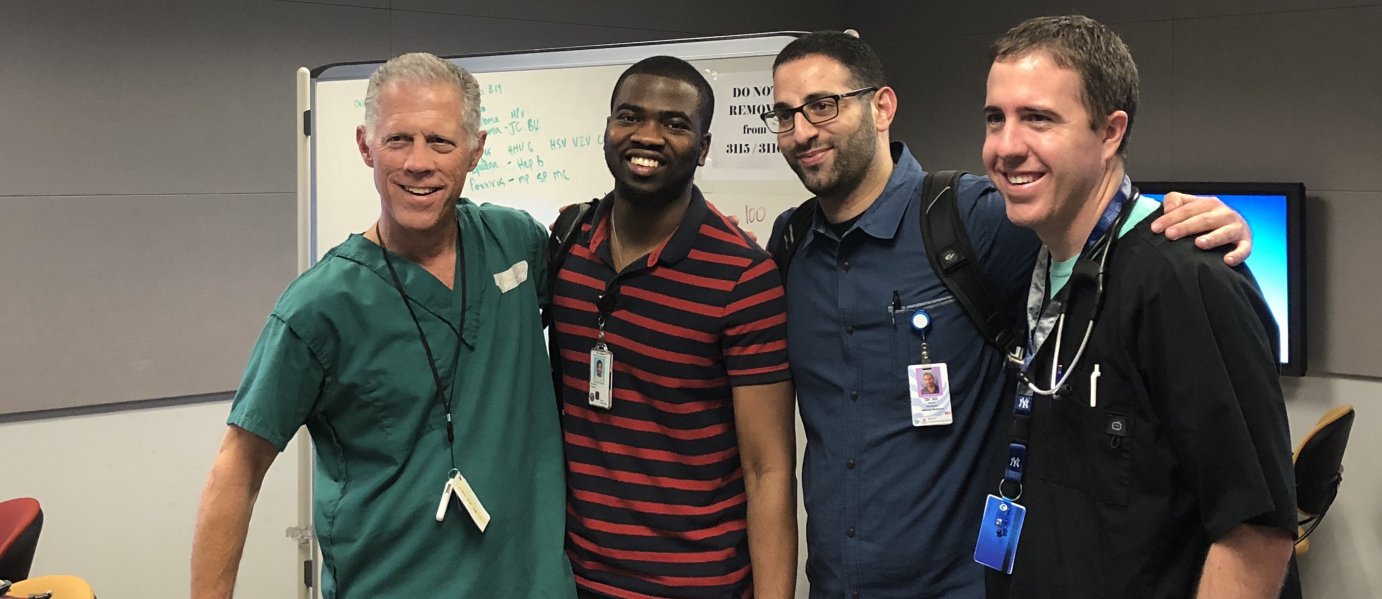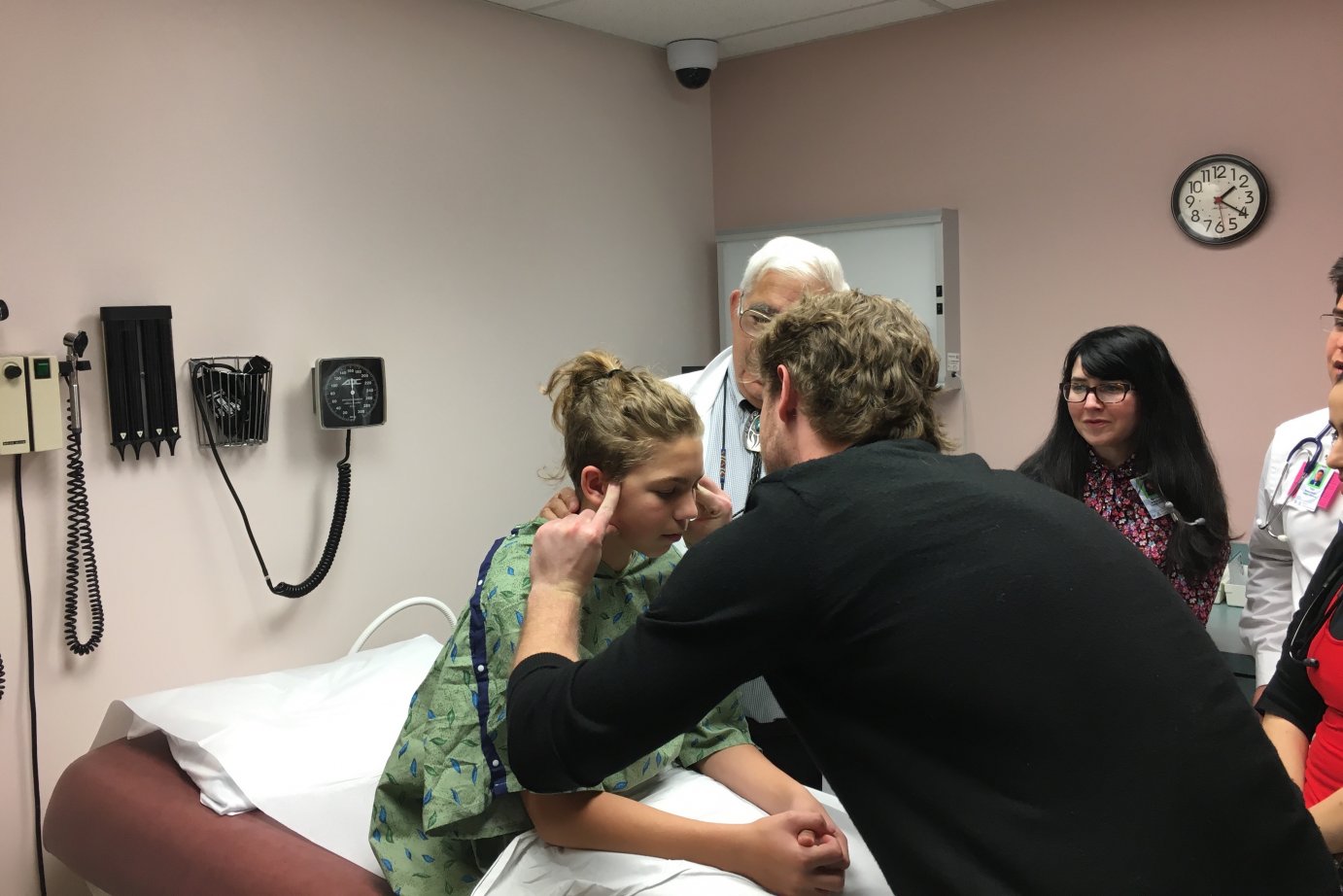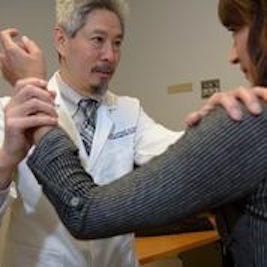• Clinical Training Component
• Research Training Component
• Teaching Component

Clinical Training Component
The clinical training component of our Fellowship Training Program is designed to provide a strong foundation for both individuals interested in clinical practice and those interested in an academic career. There is a heavy emphasis on outpatient clinical experience with exposure to a broad spectrum of rheumatic and musculoskeletal diseases. The fellow is an active member of a health care team and is responsible for longitudinal patient management and primary decision-making responsibilities under faculty supervision. The outpatient experience is complemented by training in the inpatient setting that consists of evaluation and management of patients who are hospitalized under the direct care of faculty rheumatologists. There are approximately 40 inpatient consultations per month.
 Outpatient Experience
Outpatient Experience
Each fellow has two to six outpatient rheumatology sessions per week, depending on the rotation and other concurrent training activities. Fellows complete initial evaluations, correspond with the patient's referring physician, and function as the patient's primary rheumatologist for longitudinal care under the supervision of a faculty member.
The outpatient rheumatology experience also involves participation in several unique outpatient experiences. The Division of Rheumatology has had a longstanding relationship with the Tohono O’Odham Nation and the Pascua Yaqui Tribe, and we provide rheumatologic care at their Indian Health Service Clinics. In addition, there are multi-specialty clinic sessions (one to two times monthly) for the management of patients with complex rheumatologic problems that are staffed by faculty with clinical expertise and research interest in these diseases. These sessions include:
Indian Health Service Clinics – Monthly care at the Sells, San Javier and Pascua Yaqui clinics staffed by rheumatology faculty and fellows.
Urgent New Patient Clinic – A weekly clinic reserved for urgent and semi-urgent outpatient referrals. This clinic provides fellows the opportunity to work with patients with more acute problems in the outpatient setting.
Fragility Clinic – A monthly multi-specialty clinic for the post-hospitalization management of patients with fragility fractures staffed by rheumatology, geriatrics and orthopedic surgery.
Rheum-Derm clinic (planned) - A monthly multi-specialty clinic for patients with rheumatic and dermatologic problems staffed by rheumatology and a dermatologist with training in rheumatology.
 General rheumatology clinic sessions take place at the Banner-University Medical Center South Campus Arthritis Clinic and the Southern Arizona Veterans’ Administration Health Care System. Each fellow sees one or two new patients and four to six follow-up patients per session.
General rheumatology clinic sessions take place at the Banner-University Medical Center South Campus Arthritis Clinic and the Southern Arizona Veterans’ Administration Health Care System. Each fellow sees one or two new patients and four to six follow-up patients per session.
Inpatient Experience
Each fellow spends approximately six months on the inpatient consultation service over the course of the two-year fellowship. This service provides inpatient consults for both Banner - University Medical Center Tucson and Banner - University Medical Center South. The fellow is responsible for initial evaluation and follow-up of inpatient consults.
Monthly Rotations
There are four different rotations, each one month in duration.
Inpatient Consults/Clinical Research Unit (CRU)
During this rotation, we provide inpatient consultation services to the Main and South Campuses. The cases seen on this rotation tend to be very complex, with expected diagnostic and therapeutic challenges. The consult fellow also covers the Clinical Research Unit (CRU) during this month. (add link) The consult fellow has one continuity clinic per week and the Urgent New Patient Clinic.
VA
This rotation has an emphasis on outpatient clinical experience (6 half-day clinics), with light inpatient coverage and one continuity clinic at the Banner-University Medical Center South Campus Arthritis Clinic. It allows exposure to a different patient population and healthcare system, and offers a rich educational experience.
Clinician
This rotation has an emphasis on outpatient clinical experience, with three weekly half-day continuity clinics, three monthly IHS clinics and multispecialty clinics.
Elective
This is a flexible rotation that serves first and second year fellows differently. For first year fellows, this rotation is used to plan research projects and explore selected fields to enhance clinical skills. The “selectives” we offer are Sports Medicine, Physical Therapy/Occupational Therapy, Radiology, and (possibly) Pediatric Rheumatology. For second year fellows, this time should be spent developing a research/quality improvement (QI) project with the aim of publishing an abstract before the end of the year. There are also two weekly half-day continuity clinics and the Urgent New Patient Clinic.
Research Training Component
Every fellow participates in a mentored research project and/or quality improvement project, with mentoring provided by a faculty member from the Division or otherwise affiliated with the University of Arizona Arthritis Center. Oversight is provided by a Research Mentoring Committee. Fellows’ research projects are expected to be submitted for presentation at the American College of Rheumatology or similar level national or international meetings. Funds will be provided for fellows with accepted presentations to attend these meetings. Manuscripts summarizing results are then to be submitted to peer-reviewed journals.
Fellows may also be involved in other scholarly activities, such as case reports or review articles. At least one month of protected research time is available in the first year and at least two months in the second year. Additional protected research time is available for more involved projects.
A funded third year of fellowship devoted to research is available to candidates committed to an academic research career.
Clinical Research Unit (CRU)
All fellows rotate through the CRU, which provides exposure to pharmaceutical industry-sponsored Phase 2 and Phase 3 research. Fellows become familiar with study protocols and the various instruments used to measure disease activity and disease outcome in different diseases. This exposure is useful in understanding disease processes and fosters skills that can be imported into clinical practice in the future. The CRU also provides exposure to new therapeutic agents before they come to market. Current clinical trials include patients with rheumatoid arthritis, SLE, axial spondyloarthritis and hip/knee osteoarthritis.
Teaching Component
Fellows assist with the teaching of medical students, internal medicine residents and family practice residents in the outpatient setting. Fellows also teach through presentations at the Core Curriculum Conference, Journal Club and Rheumatology Grand Rounds.

